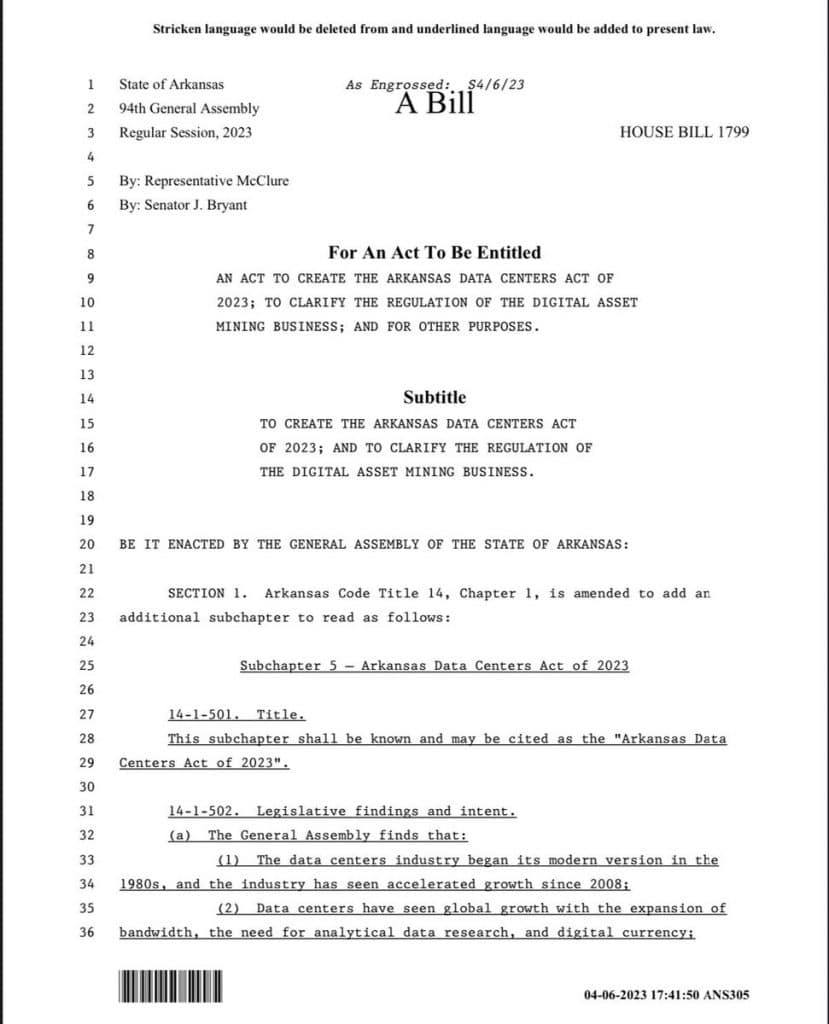
Arkansas introduceert een wetsvoorstel om Bitcoin Mining te beschermen
- Het wetsvoorstel heeft tot doel bitcoin miners te beschermen en duidelijkheid te scheppen in de regulering van digitale activa.
- Arkansas is gericht op het beschermen van mijnwerkers tegen discriminerende tarieven aangeboden door energiebedrijven.
Het Arkansas State House heeft een rekening om de Bitcoin-mijnindustrie van de staat te controleren. Het wetsvoorstel, dat al is goedgekeurd door de Senaat, wacht nu op goedkeuring door de gouverneur. De Arkansas Data Centers Act van 2023 heeft tot doel onethische bedrijfsactiviteiten te stoppen door voorschriften vast te stellen voor bitcoin-mijnwerkers.
Het wetsvoorstel suggereert dat een Bitcoin-mijnbouwbedrijf in Arkansas kan opereren als het zich houdt aan alle toepasselijke staatswetten, inclusief die met betrekking tot zakelijke regelgeving en belastingwetten, operationele en veiligheidsverordeningen, regels voor nutsvoorzieningen en tarieven die zijn vastgesteld door of namens openbare entiteiten, en arbeidsrecht op zowel staats- als federaal niveau.
De wet stelt ook voor dat mijnwerkers worden verplicht om te werken op een manier die de opwekkingscapaciteit of het transmissienetwerk van een elektriciteitsbedrijf niet onder druk zet en om alle noodzakelijke belastingen en overheidsheffingen in goedgekeurde valuta te betalen. Bovendien stelt de maatregel individuen in staat om Bitcoin-mijnbouwactiviteiten naar huis uit te voeren in overeenstemming met de toepasselijke regels en vergoedingen voor nutsvoorzieningen.
Het doel van het wetsvoorstel is om te erkennen dat datacenters lokale gemeenschappen en de staat economisch ten goede komen door banen te creëren, belastingen te betalen en andere diensten te verlenen. Het definieert de regels die nodig zijn om Bitcoin-mijnwerkers te beschermen tegen oneerlijke branchespecifieke belastingen en beperkingen.

De voorgestelde wetgeving definieert verschillende essentiële terminologieën, waaronder "digitale activa", die verwijzen naar Bitcoin en andere cryptocurrencies. Bovendien definieert het "digital asset miner" als een persoon die op digitale activa jaagt en "digital asset mining" als het proces van het laten draaien van een computer op elektriciteit om een blockchain-netwerk te beveiligen of te valideren.
Het wetsvoorstel beschrijft een "knooppunt" als een computersysteem dat blockchain gedistribueerde grootboektechnologie bevat. De term "residentie" wordt in het wetsvoorstel gebruikt om te verwijzen naar een permanent huis, appartement, enz. Interessant is dat Arkansas' "Right to Mine"-wetsvoorstel eerder deze maand door Missouri werd goedgekeurd met een daverende 12-0 stemming.
Bovendien tekende Montana eerder dit jaar een vergelijkbare bescherming voor Bitcoin-mining. Texas passeerde ook een soortgelijke. Deze wetgevende maatregelen zijn ongetwijfeld een goede zet gezien het onzekere regelgevingslandschap in de VS.







